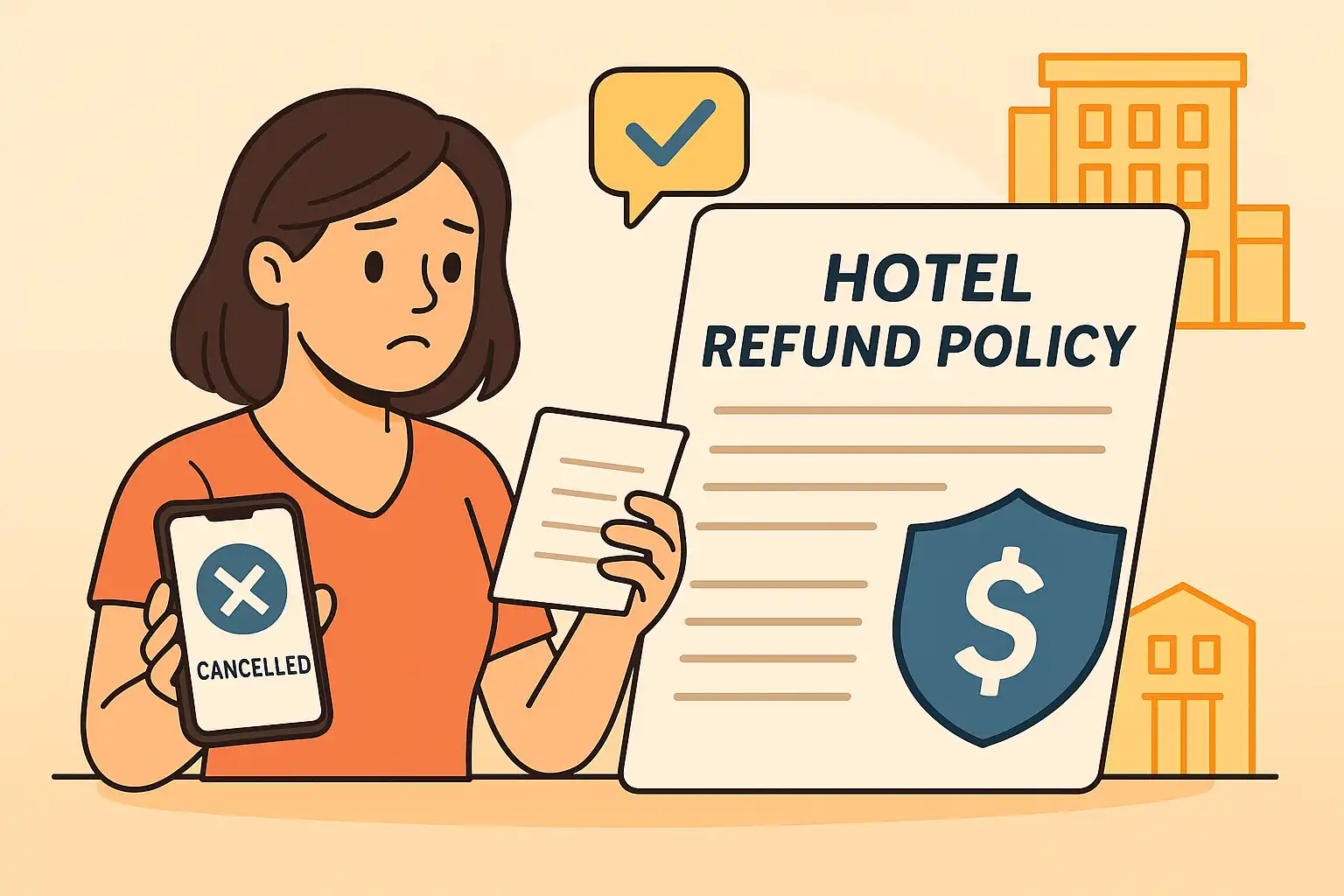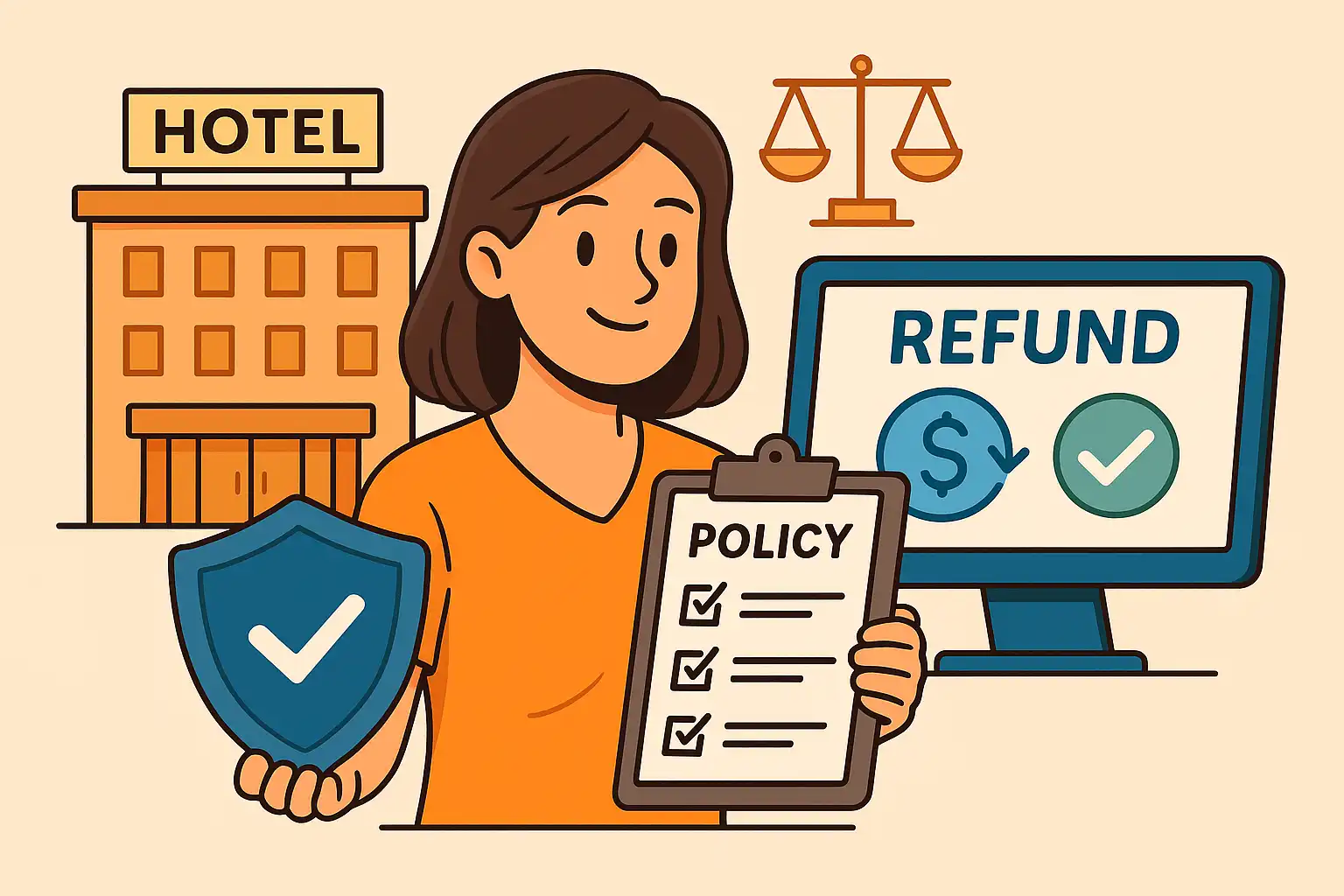Hotel Refund Policy: Complete Guide for Hoteliers
 Mika Takahashi
Mika Takahashi Mika Takahashi
Mika TakahashiIn the hotel business, cancellations aren’t just inevitable—they're a major factor shaping your revenue and guest experience. With flexible bookings seeing cancellation rates of 30-40%, having a clear, well-thought-out hotel refund policy isn’t just nice to have; it’s essential. How you handle cancellations, modifications, and disputes can make or break your bottom line, guest trust, and day-to-day operations.
A solid hotel refund policy is more than just a set of rules—it’s a key part of your revenue management toolkit and your guest relations strategy. It shields your property from unexpected losses while reassuring guests that booking with you is a safe bet. Whether you run a luxury resort, a busy business hotel, or a budget-friendly inn, the right policy helps boost bookings, cut down on disputes, and smooth out your cash flow.
In this guide, we’ll walk you through everything you need to know to create and manage hotel refund policies that work. You’ll learn how to tailor policies to your property type, pick up best practices that protect your revenue and reputation, and avoid common mistakes that can cost you money and guests.

Simply put, a hotel refund policy spells out when and how guests get their money back if they cancel, change, or dispute their booking. It’s often confused with the hotel cancellation policy, but there’s a key difference: hotel cancellation rules governs when and how guests can cancel, while refund policy deals with the money side—how much guests get back and when.
For example, a guest might cancel their booking within your allowed cancellation window but only qualify for a partial refund based on your refund terms.
Having clear refund policies isn’t just good customer service—it’s your legal safety net. When guests know exactly what to expect, they’re less likely to dispute charges or leave bad reviews over misunderstandings. This clarity gives you solid ground if a guest challenges a cancellation fee or partial refund.
Also, many places legally require you to disclose refund terms upfront. Skipping this can lead to forced refunds, fines, or worse—legal headaches you don’t want.
Refund policies directly influence your revenue. Stricter policies usually mean fewer cancellations—hotels with tougher rules can see cancellation rates drop by 7-14%. Non-refundable bookings and advance purchase rates lock in revenue, which is crucial for budget hotels running on tight margins.
On the flip side, flexible policies let you charge higher rates—luxury hotels often add a 10-25% premium for the peace of mind flexible cancellation offers.
Transparency builds trust. When guests clearly understand your refund terms, they’re more likely to book and less likely to jump ship for a competitor with murky policies. This is especially true when travel plans are shaky due to things like pandemics or other disruptions.
Hotels with clear, fair refund policies often see better guest satisfaction and more positive reviews—even when guests have to cancel. The secret? Set expectations clearly and stick to them.
Creating a hotel refund policy that protects your revenue and keeps guests happy requires a careful balance. Here’s how to start.
Look at your property’s unique needs. What are your revenue targets? When is your busy season? Who books with you—business travelers, families, group events?
For instance, a business hotel might need a 24-hour cancellation window because corporate plans change fast. A resort might require 7-14 days’ notice during peak season to cover preparation costs.
Dig into your past booking data. If you see a lot of last-minute cancellations, a stricter policy might be needed. If your bookings are steady, you might afford to be more flexible.
Check out what other hotels in your area do. Most have cancellation windows from 24 hours to a week, with refunds varying based on timing. Budget hotels lean stricter; luxury hotels offer more wiggle room.
Position your policy accordingly. Offering a bit more flexibility than your competitors can be a booking driver. But if you go too lenient, you might leave money on the table.
Set cancellation windows that work for your operations. Here’s a common breakdown:
Your cancellation window should reflect how quickly you can resell a cancelled room. Urban hotels with high demand can afford shorter notice periods; remote properties might need longer to avoid losses.
Tiered refunds encourage early cancellations and protect late bookings. For example:
One night penalty fees are another option—charge for the first night, refund the rest. It’s a good middle ground between full flexibility and strict no-refund policies.
Offer multiple rate types to appeal to different guests:
This lets you capture both price-sensitive guests and those who want flexibility.
Unpredictable events happen. Force majeure clauses cover things like natural disasters, pandemics, or government travel bans. They protect both you and your guests when plans change for reasons beyond anyone’s control.
Define what counts as force majeure and how you’ll handle affected bookings—full refunds, rebooking credits, or extended cancellation windows.
Forget legal jargon. Use plain English to explain refund percentages, deadlines, and fees. Include examples to make it real.
Make sure your policy is easy to find—on your website, booking pages, and confirmation emails. Hidden terms cause confusion and disputes.

Different hotels need different policies. Here’s how to tailor yours.
Guests paying premium rates expect flexibility. Offer 48-72 hour free cancellation windows and tiered refunds—100% refund for cancellations 3+ days ahead, 75% for 1-3 days, and 25% for same-day cancellations.
Consider complimentary rebooking options so guests can reschedule within a year without penalty. This keeps guests coming back.
Special events like weddings or conferences often need stricter terms because of the prep involved.
Business travelers book last minute and change plans often. A 24-hour free cancellation window is standard.
For corporate accounts, you might offer even more flexible terms or same-day cancellation privileges.
Group bookings and meeting rooms usually require longer notice—48-72 hours—to cover costs.
Pro tip: Offering rebooking credits instead of full refunds can keep revenue while giving clients flexibility.
These properties often operate on tight margins and need stricter policies.
A typical setup is full refunds 48+ hours before check-in and no refunds within 48 hours.
Non-refundable rates with 10-20% discounts attract price-sensitive guests willing to trade flexibility for savings.
One night penalties for late cancellations are a fair compromise.
Boutique hotels thrive on personal service and guest relationships.
A 48-hour cancellation window with partial refunds (75% for timely cancellations, 25% for last-minute changes) balances protection and flexibility.
Offering rebooking credits helps maintain goodwill.
Adjust policies seasonally—stricter during peak demand, more lenient otherwise.
Longer booking lead times and seasonal demand require stricter policies.
Require 7-14 days’ notice for full refunds during peak seasons.
Use graduated refund scales: 100% refund 14+ days ahead, 50% for 7-14 days, 25% for 3-7 days.
Package deals and activities may have separate cancellation terms.
Force majeure clauses for weather events like hurricanes are especially important.

Writing your policy is just the start. Here’s how to make it work in practice.
Put refund terms front and center during booking. Don’t hide them in fine print.
Use simple charts or visuals to show cancellation deadlines and refund amounts. This cuts confusion and disputes.
Keep your policies consistent across your website, OTAs, and front desk.
Your team needs to know the policy inside out and handle refund requests professionally.
Give them scripts for explaining terms and clear guidelines for exceptions.
Empower staff to make goodwill gestures when appropriate, but have a clear approval process for bigger exceptions.
Set up your PMS to send cancellation deadline reminders 72 and 24 hours ahead.
Include rebooking links to give guests alternatives.
Track engagement to refine messaging.
Automate refund calculations and payments through your PMS to reduce errors and speed up processing.
Set up reports to monitor cancellations, refunds, and revenue impact monthly.
Create templates for guest communications covering full, partial, or no refunds.
When rooms cancel last minute, a waitlist helps you fill them quickly.
This can let you offer more flexible refunds because you can resell rooms faster.
Dynamic pricing for last-minute bookings can offset lost revenue.
Rebooking credits or future stay vouchers are great alternatives to cash refunds.
Partner with nearby properties for overflow situations to keep guests happy.
Aim to process refunds within 3-5 business days.
Slow refunds frustrate guests and damage your reputation more than the cancellation itself.
Be clear about refund timelines so guests know what to expect.
Keep thorough records of cancellations, refunds, and any exceptions.
Use this data to spot trends and adjust policies as needed.
Review your policies quarterly against market trends and guest feedback.
Adjust for seasonality and legal changes.
Benchmark against competitors to stay competitive.
Here are common pitfalls to watch out for:
Legal jargon confuses guests and leads to disputes.
Keep your language simple and direct.
Make sure guests see refund policies clearly before booking.
Hidden terms cause frustration and chargebacks.
Different terms on your website and OTAs confuse guests.
Coordinate with partners to keep policies uniform.
Too strict policies scare off bookings.
Balance protection with flexibility to stay competitive.
Not addressing emergencies can hurt your reputation and lead to legal trouble.
Have clear force majeure terms.
Groups need different rules because of higher stakes.
Include cancellation terms for meetings, catering, and events.
Manual refunds are slow, error-prone, and inconsistent.
Automate as much as possible.
Consumer protection laws vary.
Make sure your policy complies with local regulations.
Be flexible for genuine emergencies.
Train staff to handle exceptions with empathy.
Untrained staff cause inconsistent enforcement and guest frustration.
Regular training is a must.

Writing the policy is step one. Making it work requires integration and ongoing effort.
Configure your PMS to apply refund rules automatically based on cancellation timing and booking details.
Automate refund processing and flag exceptions for manual review.
Connect with payment systems for quick refunds.
Develop clear steps for staff to follow when handling cancellations and refunds.
Include decision trees and scripts to ensure consistency.
Document how to handle disputes and exceptions.
Define who can approve policy exceptions and under what circumstances.
Track exceptions to spot patterns and adjust policies if needed.
Use monthly reports to track cancellation rates, refund costs, and guest satisfaction.
Stay alert to competitor policy changes and market trends.
Generate automatic reports on cancellations and refunds to spot opportunities for improvement.
Analyze guest feedback related to refunds to refine communication and policies.
Prepare professional email templates for full, partial, and no refunds.
Include rebooking options and alternative solutions.
Customize messages for different guest types.
Use surveys and reviews to gather guest input on refund experiences.
This helps you improve policies and guest communication.
Review policies quarterly against competitors and legal requirements.
Adjust for seasonality and market shifts.
Myth vs Reality:
Myth: Strict refund policies always protect your revenue.
Reality: Overly strict policies can scare off bookings and hurt your reputation. Balancing protection with flexibility often leads to better long-term results.
Pro tip:
Use your PMS to automate cancellation reminders and refund processing. This reduces errors, speeds up refunds, and frees your staff to focus on guest service.
A clear, fair hotel refund policy is a vital part of running a successful property. It protects your revenue, builds guest trust, and keeps operations running smoothly.
Remember to:
By treating your hotel refund policy as a strategic tool rather than a necessary evil, you can improve guest satisfaction, reduce disputes, and create a more predictable revenue stream.
Take a fresh look at your current policy today. Is it clear? Fair? Aligned with your business goals? If not, now’s the time to make it right. Your guests—and your bottom line—will thank you.